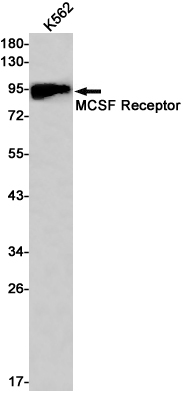
| WB | 1/500-1/1000 | Human,Mouse,Rat |
| IF | 咨询技术 | Human,Mouse,Rat |
| IHC | 咨询技术 | Human,Mouse,Rat |
| ICC | 技术咨询 | Human,Mouse,Rat |
| FCM | 咨询技术 | Human,Mouse,Rat |
| Elisa | 咨询技术 | Human,Mouse,Rat |
| Aliases | M-CSF Receptor; CSF-1-R; CSF-1R; M-CSF-R; Proto-oncogene c-Fms; CD115 |
| Entrez GeneID | 12978 |
| WB Predicted band size | Calculated MW: 109 kDa; Observed MW: 109 kDa |
| Host/Isotype | Rabbit IgG |
| Antibody Type | Primary antibody |
| Storage | Store at 4°C short term. Aliquot and store at -20°C long term. Avoid freeze/thaw cycles. |
| Species Reactivity | Human |
| Immunogen | Recombinant protein of mouse MCSF Receptor |
| Formulation | Purified antibody in TBS with 0.05% sodium azide,0.05%BSA and 50% glycerol. |
+ +
以下是3-4篇关于M-CSF受体(CSF1R)抗体的参考文献及简要摘要:
1. **"Colony-stimulating factor-1 receptor signaling is required for macrophage invasion in mammary tumors"**
- 作者:Lin, E.Y., et al.
- 摘要:研究证明CSF1R抗体阻断其信号通路可抑制肿瘤相关巨噬细胞(TAMs)浸润,延缓小鼠乳腺癌模型进展,提示靶向CSF1R可能通过调节肿瘤微环境发挥抗肿瘤作用。
2. **"The role of colony-stimulating factor-1 in immunity and disease"**
- 作者:Stanley, E.R. & Chitu, V.
- 摘要:综述了CSF1R在巨噬细胞分化及免疫调节中的核心作用,并探讨其抗体在治疗炎症性疾病(如类风湿性关节炎)和癌症中的潜在应用。
3. **"CSF1R inhibition with emactuzumab depletes tumor-associated macrophages and ameliorates tumor pathology in a preclinical model"**
- 作者:Ries, C.H., et al.
- 摘要:报道了一种人源化抗CSF1R单抗(emactuzumab)的临床前研究,显示其能选择性清除TAMs,改善实体瘤病理特征,为后续临床试验提供依据。
4. **"Targeting tumor-associated macrophages with anti-CSF-1R antibody reveals a strategy for cancer therapy"**
- 作者:Pyonteck, S.M., et al.
- 摘要:通过抗CSF1R抗体阻断CSF1/CSF1R轴,显著减少胶质母细胞瘤模型中的TAMs,增强化疗效果,验证了该策略在联合治疗中的潜力。
以上文献涵盖基础机制、治疗应用及临床前研究,可根据需求进一步查阅原文。
The macrophage colony-stimulating factor (M-CSF) receptor, also known as CSF1R or CD115. is a tyrosine kinase receptor encoded by the *CSF1R* gene. It plays a critical role in the survival, proliferation, and differentiation of mononuclear phagocytes, including monocytes, macrophages, and osteoclasts. M-CSF Receptor binds its ligands, M-CSF and interleukin-34 (IL-34), activating downstream signaling pathways such as PI3K/AKT and MAPK/ERK, which regulate immune responses, bone remodeling, and tissue homeostasis. Dysregulation of CSF1R signaling is implicated in diseases like cancer, inflammatory disorders, and osteoporosis, making it a therapeutic target.
Antibodies targeting the M-CSF Receptor are essential tools for studying its expression, localization, and function. They are widely used in techniques like Western blotting, immunohistochemistry (IHC), and flow cytometry to detect receptor levels in cells or tissues. These antibodies also facilitate research into CSF1R-mediated signaling in tumor-associated macrophages (TAMs), which promote tumor progression and immune evasion, as well as in inflammatory conditions like rheumatoid arthritis. Additionally, neutralizing anti-CSF1R antibodies are explored as therapeutic agents to inhibit pathogenic signaling in cancer or autoimmune diseases.
Validation of M-CSF Receptor antibodies is crucial, as cross-reactivity with related kinases or splice variants can occur. Researchers often use knockout cell lines or blocking peptides to confirm specificity. Both monoclonal and polyclonal antibody formats are available, each offering distinct advantages in sensitivity and application scope. Overall, M-CSF Receptor antibodies remain pivotal in advancing our understanding of myeloid cell biology and developing targeted therapies.
×